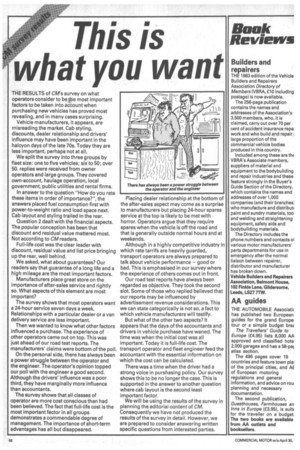This is what you want
Page 58

If you've noticed an error in this article please click here to report it so we can fix it.
THE RESULTS of CM's survey on what operators consider to be the most important factors to be taken into account when purchasing new vehicles has proved most revealing, and in many cases surprising.
Vehicle manufacturers, it appears, are misreading the market. Cab styling, discounts, dealer relationship and drivers' influence may have been important in the halcyon days of the late 70s. Today they are less important, perhaps not at all.
We split the survey into three groups by fleet size: one to five vehicles; six to 50; over 50. replies were received from owner operators and large groups. They covered own-account, haulage operation, local government, public utilities and rental firms.
In answer to the question "How do you rate these items in order of importance?", the answers placed fuel consumption first with power-to-weight ratio and load space next. Cab layout and styling trailed in the rear.
Question 2 dealt with the financial aspects. The popular conception has been that discount and residual value mattered most. Not according to CM readers.
Full-life cost was the clear leader with discount, residual value and list price bringing up the rear, well behind.
We asked, what about guarantees? Our readers say that guarantee of a long life and a high mileage are the most important factors.
Manufacturers place great store on the importance of after-sales service and rightly so. What aspects of this element are most important?
The survey shows that most operators want a 24-hour service seven days a week. Relationships with a particular dealer or a van delivery service are less important.
Then we wanted to know what other factors influenced a purchase. The experience of other operators came out on top. This was just ahead of our road test reports. The manufacturers' claims were bottom of the poll.
On the personal side, there has always been a power struggle between the operator and the engineer. The operator's opinion topped our poll with the engineer a good second. Although the drivers' influence was a poor third, they have marginally more influence than accountants.
The survey shows that all classes of operator are more cost conscious than had been believed. The fact that full-life cost is the most important factor in all groups demonstrates a commendable degree of management. The importance of short-term advantages has all but disappeared. Placing dealer relationship at the bottom of the after-sales aspect may come as a surprise to manufacturers but placing 24-hour spares service at the top is likely to be met with horror. Operators argue that they require spares when the vehicle is off the road and that is generally outside normal hours and at weekends.
Although in a highly competitive industry in which rate tarrifs are heavily guarded, transport operators are always prepared to talk about vehicle performance — good or bad. This is emphasised in our survey where the experience of others comes out in front.
Our road test reports have always been regarded as objective. They took the second slot. Some of those who replied believed that our reports may be influenced by advertisement revenue considerations. This we can state categorically is not so, a fact to which vehicle manufacturers will testify.
But what of the other two aspects? It appears that the days of the accountants and drivers in vehicle purchase have waned. The time was when the initial cost was all important. Today it is full-life cost. The transport operator and fleet engineer feed the accountant with the essential information on which the cost can be calculated.
There was a time when the driver had a strong voice in purshasing policy. Our survey shows this to be no longer the case. This is supported in the answer to another question where cab layout is the second least important factor.
We will be using the results of the survey in planning the editorial content of CM. Consequently we have not produced the results of the survey in detail. However, we are prepared to consider answering written specific questions from interested parties.




































































































